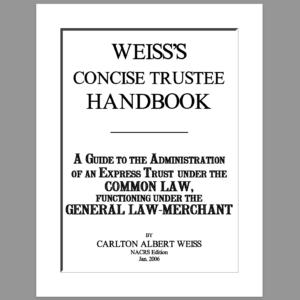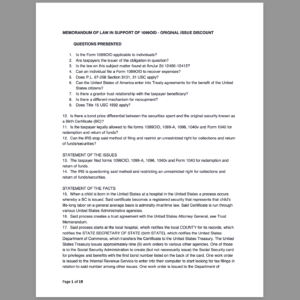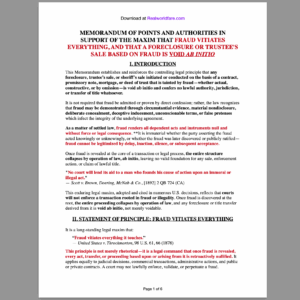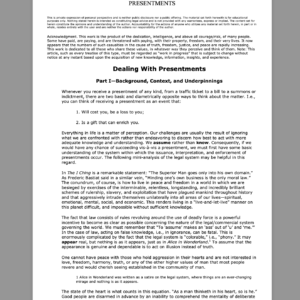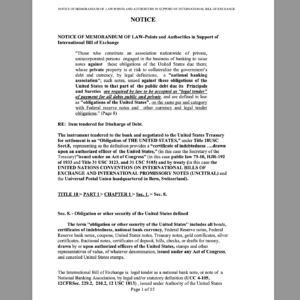In a world dominated by fiat currency, banking monopolies, and artificial debt systems, most Americans are unaware that they possess lawful tools to discharge obligations — not through payment, but through assignment. As a private American operating in one’s natural capacity, you have the power to lawfully assign debt to the U.S. Department of the Treasury for discharge under existing public policy, codified federal law, and equity.
This isn’t theory — it’s grounded in the very statutes, codes, and commercial processes that banks and institutions use every single day. The only difference? They’ve been taught. You haven’t.
⚖️ The Legal Foundation: Public Policy Since 1933
In 1933, House Joint Resolution 192 (Public Law 73-10) removed the requirement to pay debts in gold, effectively eliminating lawful money (gold and silver) from circulation. This action made it impossible for Americans to legally pay debts in substance.
As a remedy, the U.S. government pledged to discharge all public and private debts dollar-for-dollar using credit, under what is now known as public policy. In essence, all debts today must be discharged — not paid — because there is no real money in circulation.
“Every obligation… shall be discharged in any coin or currency which at the time of payment is legal tender for public and private debts.”
— 31 U.S.C. § 5118(d)(2)
🏛️ Your Right to Assign Debt: 31 U.S.C. § 3123
Under 31 U.S. Code § 3123, the United States pledges its full faith and credit to all public obligations. If a debt or obligation is an “obligation of the United States” under 18 U.S.C. § 8, then the Treasury becomes the fiduciary party responsible for honoring it — if it is lawfully assigned and presented.
As a private American (not acting in the role of a U.S. citizen/ens legis fiction), you can tender value through a lawful instrument (such as a bill of exchange, promissory note, or bonded assignment) and assign the obligation to the Treasury for discharge. This remedy is fully supported by the law — it simply isn’t made public for the average person.
🧾 What You Must Do to Lawfully Assign the Debt:
-
Act in your private capacity, as a living man or woman, not as a corporate “person.”
-
Perfect your status and authority — typically through a private trust, executor role, or secured party standing.
-
Tender a valid negotiable instrument under UCC § 3-104 and § 3-303.
-
Assign the public obligation to the Treasury in writing — this can be done in an affidavit or in a UCC-3 assignment filing.
-
Send all materials via registered mail to the Department of the Treasury to establish lawful notice.
-
Optionally, report the discharge through IRS forms (1099-A, 1099-C, and/or 1099-OID) to document the lawful transaction.
💡 Why It Works
Because you’re not paying the debt — you’re assigning it for setoff using the government’s own obligation to settle public liabilities under public credit. This is the same system banks use when they “write off” loans, claim losses, or bundle debts as securities.
The key distinction is your position:
Are you acting as a debtor (public U.S. citizen) or as a secured party, creditor, and authorized representative of a private trust or estate?
✅ The Treasury’s Role
Once the assignment is properly made and served, the U.S. Treasury has a fiduciary duty to process the obligation. If they do not respond or rebut, they are bound by estoppel and acquiescence to the lawful assignment. This is why affidavits of truth, UCC filings, and IRS forms are so powerful — they create a public record that cannot be ignored without violating due process and commercial law.
🔐 Private Americans Have Lawful Power — If They Use It
You don’t need to “pay” a debt with something that no longer exists (gold-backed money). Instead, as a private American, you lawfully discharge debt by assigning it to its source — the very government that removed money and substituted credit in 1933.
This is your remedy in equity — a lawful, peaceful, and honorable solution for those who choose to operate with knowledge, clean hands, and truth.
📎 Final Notes:
-
Use registered or certified mail to preserve legal record of notice and service.
-
File a UCC-1 to perfect your interest and establish standing.
-
Create a lawful assignment affidavit or UCC-3 to record the transfer.
-
Include a cover letter or declaration to the Treasury or Fiscal Service.
✉️ Sample Treasury Address:
U.S. Department of the Treasury
1500 Pennsylvania Avenue NW
Washington, D.C. 20220
Or for IRS-related discharges:
Department of the Treasury – Internal Revenue Service
Ogden, UT 84201 (or other designated center)
✊ Stand in Law. Operate in Equity. Act as a Private American.
You are not a beggar. You are not a debtor.
You are a living man or woman, capable of lawful action, peaceful remedy, and full discharge — if you claim your authority and act accordingly.
How Assigning Debt to the Treasury Helps Reduce the National Debt
One of the most misunderstood truths in today’s financial system is that the American people are the creditors to the United States, not its debtors. Every time a private American assigns a valid public obligation to the U.S. Treasury for discharge, they are not only securing their own equitable remedy — they are reducing the national debt in the process.
When banks issue loans, traffic courts issue fines, or agencies create claims, they’re creating new obligations backed by the credit of the people — not the government. The national debt grows because most people either don’t challenge these claims, or “pay” them with Federal Reserve Notes, which only extends the cycle of debt-based fiat.
But when a debt is:
-
Lawfully tendered by a private party,
-
Assigned back to the Treasury under the statutes that obligate them to settle public debt (31 USC § 3123, § 5118),
-
And properly documented as discharged through IRS forms like 1099-A, 1099-C, or 1099-OID,
The Treasury records that obligation as settled and retired, removing it from circulation. That means one less liability floating on the books of the United States — and one more action taken by an informed American in service to the Republic.
“It is the duty of the creditor to bring balance to the books of the debtor.”
– Equity Maxim
By learning to act as the true creditor, you are not only exercising your lawful right to remedy — you are helping to restore balance to a national system that has leaned on the ignorance of its own people for far too long. When you discharge your obligation lawfully and assign it to the Treasury, you’re doing your part to:
-
Reduce public liability,
-
Stabilize the national balance sheet,
-
And assert your rightful position in commerce and governance.




